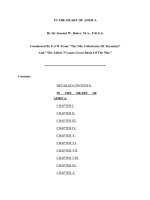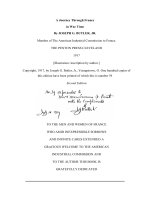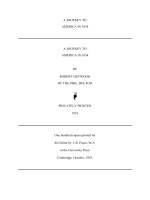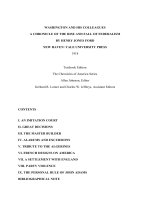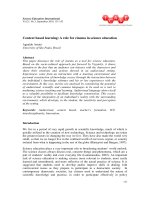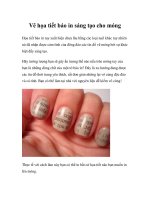Drawing a Fun Cartoon Mouse in Just Four Simple Steps ppt
Bạn đang xem bản rút gọn của tài liệu. Xem và tải ngay bản đầy đủ của tài liệu tại đây (35.7 KB, 5 trang )
Drawing a Fun Cartoon Mouse
in Just Four Simple Steps
So Disney may have set the precedent for what a cartoon mouse that talks
and walks upright is supposed to look like, but it can be a lot more fun
creating one of your own. To make it an even more attractive idea, you can
do it in four simple steps. Are you ready? Grab your pencil and paper, and
let's go!
Step 1 - The Head and Body
The base of any cartoon drawing is always the head and body, and we'll start
our mouse drawing the same way. The head will be an egg shape lying on its
side with the pointier end facing right. The body is like the shape of a bean,
with the top hidden behind the egg. Simple, right? Let's go ahead and move
on.
Step 2 - Ears, Nose, and Haunches
The ears and nose are the most important features to a mouse because they
use ears to detect danger and their noses to smell food. Our cartoon mouse
will get these next. A nose is simply a rounded off triangle just left of the
end of the snout. The ear on the side away from us will just be a bump, while
the one facing us will be a large rainbow-shaped arc, with another smaller
one inside.
Our little mouse is sitting down, so we'll draw haunches for back legs. The
one facing us is just another rainbow, facing at a 45 degree angle. The foot
on this will extend just beyond the body and be a thin, rounded "V" shape
that meets the arc of your haunch. On the side facing away, you'll simply
curve a line starting just above the stomach and bring it straight down to
another foot at the same level as the first. The rest of the leg is hidden from
view.
Step 3 - Arms and a Tail
The front legs on our cartoon mouse will look like arms, with a basic "V"
shaped bend at the elbows. To create these in the right spot, you might first
want to draw the "belly" of the mouse, which is usually a different color than
the rest of the fur. This will simply curve around from the top of the visible
back leg to a point where it disappears around the other side, just below the
neck. Now, the arms will begin just above that curved line on either side.
When your mouse smells food, he has to see to find it, so add a tiny circle
close to the visible ear for an eye. Now, he has to be able to eat it, so from
the bottom tip of the nose, draw a short straight line down, then connect an
upside down "V" for the mouth.
You can add two slash marks to the front foot for toes.
Now, you can get creative with the tail. Of course, the cartoon mouse is
sitting up and needs balance, so the tail should be on the ground behind him.
However, you can choose your shape - an S curve or, like mine, a simple
"U" shape. Make sure the tail is thicker at the starting point and comes to a
point at the end.
Step 4 - The Plate and a Sesame Bun
Add whiskers to your cartoon mouse with long, sweeping, shallow arcs, and
give him a right hand with a quick upside down "W". Add spots to the tail -
these will be the little bumps of the tail - and give the mouse a treat. In his
left hand, draw a bit of cheese for good behavior. Start with a triangle,
adding circles in the middle and three-dimensional sides. Now, your cartoon
mouse can be colored and actually seems like a cuddly pet!
